- A comprehensive account of
experiences whilst driving from Pune to Spiti+ lovely pictures, travel and
driving tips and how did the Isuzu vehicle perform. See the highest post office
in the world & village accessible by road.
Completed my dream trip to Spiti from
Pune recently with the help of HVK
and his outstanding team.
After doing Ladakh from Pune in 2013
in my FIAT Palio 1.6, was raring for another road trip for the last couple of
years in my Isuzu VCross. Spiti eventually happened after a lot of planning and
of course help from HVK and team.
The route we took was Pune was Nasik-Dhule-Ratlam-Chittorgarh-Chandigarh-Rampur
and thereafter the road which leads to Kaza in Spiti Valley.
It took us fourteen days to complete
this trip from Pune to Spiti and back. We drove app 5,000 kms. I was joined on
this trip by two school friends. We not only enjoyed this adventure together
but also got to know each other much better than what we did before.
Chief and the CHD team not only took
care of the route plan but also supported with stay arrangements at each place.
We planned some of the stay options ourselves during the return journey for personal
reasons. After finalizing the plan with Chief we made some changes on the fly because
of weather conditions and time constraints.
Day 1 Pune to Chittorgarh (Rajasthan)
The first two days were from Pune to
Chittorgarh then to Chandigarh. Both were long drives (880 kms and 835 kms
respectively). Every year I do a road trip to my native place Mangalore, which
is about 750 kms one way, so doing 800+ drives back to back was a first for me.
My other school friend (Vishal Pawar)
had an injury on his left hand, hence could not drive. I was more than excited about
the challenge and drove close to 1700 kms in two days. Our co-traveller (Anoop
Mahajan) was supposed to join us later on in the trip i.e. from Kalpa since he
took a Pune Chandigarh flight. Hence, it was just two of us at the start of the
trip.
The Pune to Ratlam stretch has good
open highways but I found this route to be a tad boring since there are very few
good eateries along this stretch and the route lacks character as is
found via Gujarat and Rajasthan. The only thing that got me excited was the
magnificent view of mountains on the outskirts of Nasik. I was familiar with
the Gujarat-Rajasthan highway to get to North India so we wanted to try a
different route i.e. via Nasik-Ratlam.
It is amazing to see how the food, attire, accents and of course scenery change
as you cross from one state to another. I was expecting some impediments by
cops in Maharashtra and Madhya Pradesh but we had no problems whatsoever. As we
crossed into Madhya Pradesh, the landscape essentially flattened out and we
could maintain good speeds. We had excellent breakfast of missal-paav on the
outskirts of Nasik and since we were feeling reasonably full even into late
afternoon we decided to skip lunch and munch energy bars instead.
We saw wheat plantations almost endlessly as
we traversed through MP. It was in late evening that we crossed into Rajasthan and made it to a
Chittorgarh hotel.
Day 2 Chittorgarh
to Chandigarh
We left Chittorgarh at around 8.30 am.
Most of this stretch has excellent highways except for a few diversions which
slowed us down a bit. The highway from Panipat to Chandigarh was a dream tarmac drive. We reached
Chandigarh by 7.30 pm.
Day 3 Chandigarh to Rampur
Our journey from Chandigarh to Rampur
began on a late note since we had to pick up snow chains from one of the hotels
in Chandigarh. It was almost 12 noon as we hit the Himalayan highway from
Chandigarh to Shimla. Roads are excellent and we got a good sense of the climb
that was ahead of us as we started spotting the Himalayas on the horizon.
It was Maha Shivratri that day, i.e. pretty
big in Himachal Pradesh. Hence, we could spot crowds at several Shiv temples
along this highway. We had to actually take the Chail route to Rampur in order
to avoid the crowds at Shimla bypass but we probably missed a turn so we ended
up bypassing Shimla anyways. Even though we were not caught in traffic jams at Shimla, we were slowed
down by the touristy crowd arriving and departing from Shimla.
It was the first time for Vishal and me
in this part of the country so were aghast how much of the mountains was
ransacked for human pleasure. All the construction on top of these mountains
was actually an eye sore as we bypassed Shimla. We saw many stalls of Kinnow
juice along this stretch. I had never tried kinnows before so we stopped by and
picked some. They tasted heavenly. Their sweet taste and pulpy texture made a
great snacking option as our heads got a bit fuzzy with the non-stop climbing
we were experiencing on this stretch.
We had our first snow sighting at Kufri top. It was fellow traveller Vishal’s dream to see snow. He was as excited as a small kid when he saw the snow lining up both sides of the roads. As we got down from Kufri and started climbing up again at Narkanda, we got our second sighting of snow.
Those who have travelled in the hills
would know that travel is measured, not in terms of kilometres but in terms of
hours. Short distances can take you a fairly long time due to the winding roads
and usually two lane fairways only unlike the straight four or six lane highways
in the plains. Soon enough, it was dark and we took a tea break somewhere
around Chalan village.
The tea cost Rs 20/ for two cups of
tea but the owner of the tea shop was warm and welcoming that he offered us
Mahashivratri Prasad. It was a local delicacy made of oils from a variety of
expensive nuts, stuffed with potato and some local vegetables and fried into a Puri
like consistency. We thanked the tea shop owner not knowing that this was just
the beginning of the hospitality from the people of Dev Bhoomi Himachal
Pradesh.
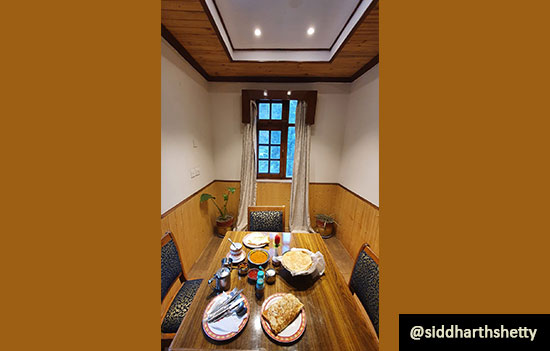 Breakfast at Rampur Bushair Hotel.
Breakfast at Rampur Bushair Hotel.
We reached a wonderful property at
Rampur called Bushair Regency and went for the suite which was comfortable and
luxurious. The staff was very warm and welcoming. This was one of the best stays of the trip & at very
nominal charges.
We were told that Sutlej Cafe nearby serves
excellent food so we went there. It was about 9 pm. There was a Manager and solitary
cook. We asked the manager to serve us what they could make soon. In the next
15-20 mins we got some excellent mushroom masala and mixed veggies that left us
licking all our fingers. It was almost 9.45 pm by the time we finished.
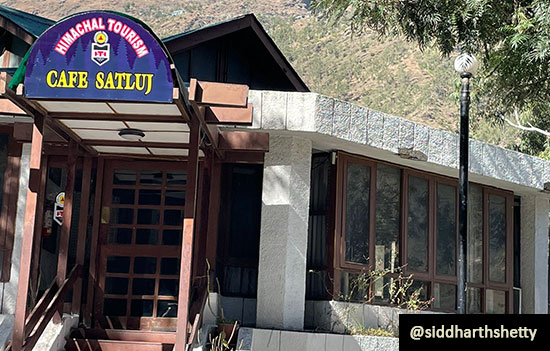 Dinner at Hotel Sutlej. Great hospitality and food.
Dinner at Hotel Sutlej. Great hospitality and food.
We asked the Manager and the cook to
wind up and have food themselves. It was only then that we got to know that being
Maha Shivratri, the manager and cook were fasting for the day. They were
waiting to get off duty and break the fast with their family members. When we
heard this we felt guilty that we had made them stay back.
Both of them told us that guests were
most important and their closing time was 10 pm anyways so they were more than
happy to serve us. Having heard this, we quickly finished dinner so that the
staff could leave home on time. This was another experience of Himachal hospitality
for us.
During the stretch from Pune to Rampur
we did not drive at night. We did a few hours in the evening as we reached
Chandigarh and Rampur but it was not late night driving.
Day 4
Rampur to Chitkul, bypassing Kala-Sangla and Raksham
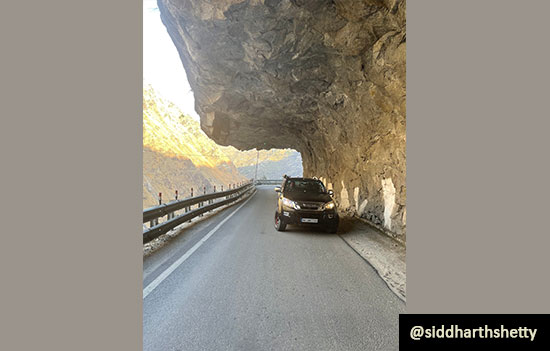 The famous cliff overhangs as you enter Kinnaur.
The famous cliff overhangs as you enter Kinnaur.
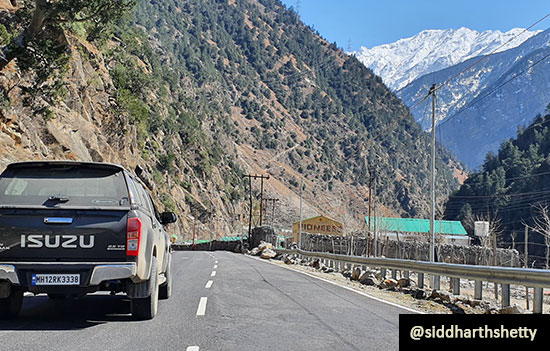 On the Rampur-Kaza highway before Powari, at the Chitkul turnoff on the right.
On the Rampur-Kaza highway before Powari, at the Chitkul turnoff on the right.
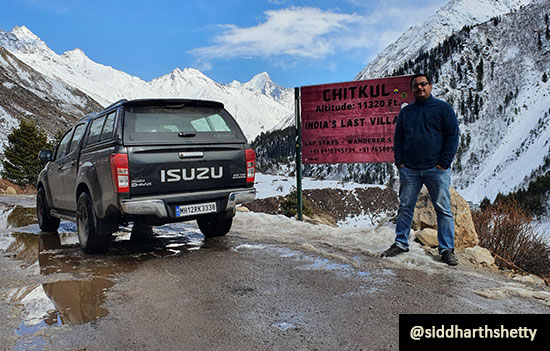 Chitkul is the last Indian village near Tibet border (old Indo-Tibet road).
Chitkul is the last Indian village near Tibet border (old Indo-Tibet road).
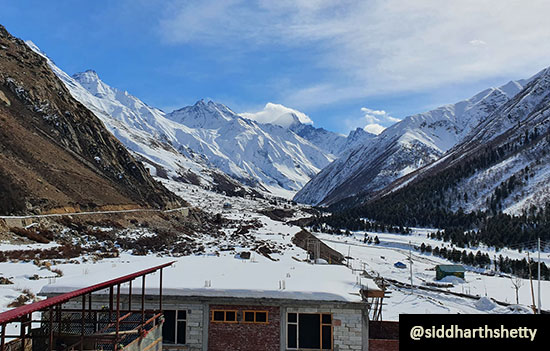 View from our room at Hotel Saama, Chitkul. We got a taste of the Spiti winter at Chitkul.
View from our room at Hotel Saama, Chitkul. We got a taste of the Spiti winter at Chitkul.
We spent one night at Chitkul when it was -7 degrees. Chitkul, at 3000 metres altitude, is regarded as the "last village" before the Tibet border, and nestles on the banks of the Baspa River, surrounded by rugged Himalayan peaks. The village itself is snowbound in the winter and is the place to visit to see some great specimens of old Himachal architecture.
Kalpa is the base if you
wish to visit Sangla, Raksham, Chitkul and Spiti Valley. Roads go via Kalpa. If
coming from Simla you can bypass Kalpa and drive directly to Sangla Valley/Chitkul
as we did. From Chitkul to Spiti we stopped by at Kalpa. We spent two nights at Kalpa, the first when we drove in from Chitkul. The next morning we went
hiking to Suicide point Kalpa. Due to the snow the previous night, the
Himalayas were just looking gorgeous in the sunshine that morning.
To
see Kalpa pics of 2001
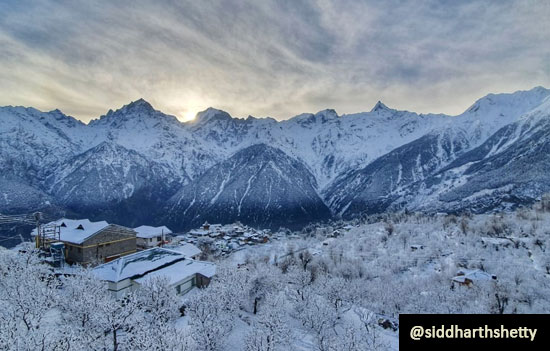 View of Kinner Kailash Valley on the day of the early morning hike.
View of Kinner Kailash Valley on the day of the early morning hike.
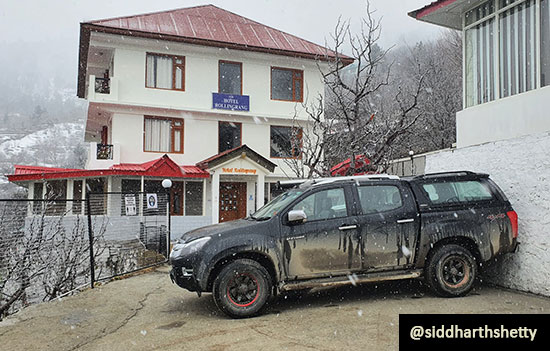 The truck parked at Hotel Rollingrang, Kalpa.
The truck parked at Hotel Rollingrang, Kalpa.
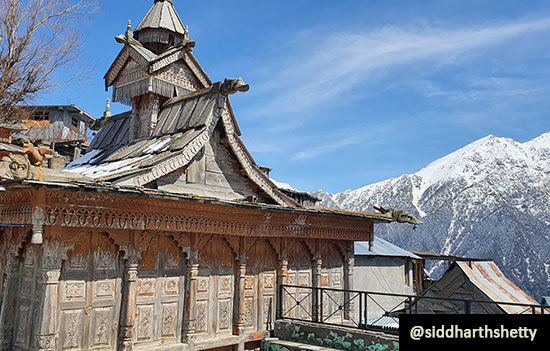 Temples Kalpa.
Temples Kalpa.
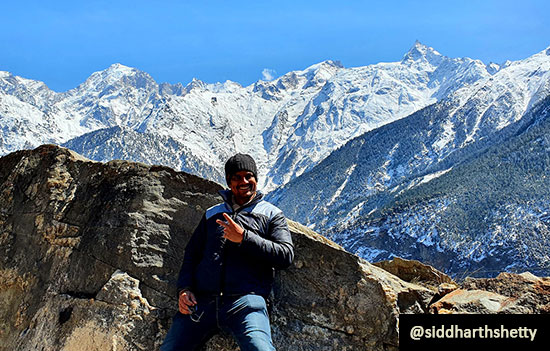 Fantastic view of the Himalayas at Kalpa
Fantastic view of the Himalayas at Kalpa
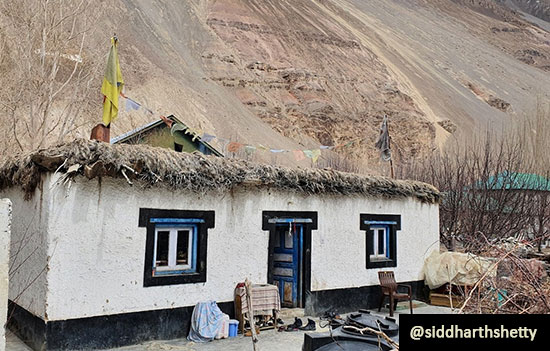 Our lovely home stay at Tabo.
Our lovely home stay at Tabo.
It is called
Mud House and managed by a super hospitable lady Anita Bodh. Her
number 91 90151 75185.
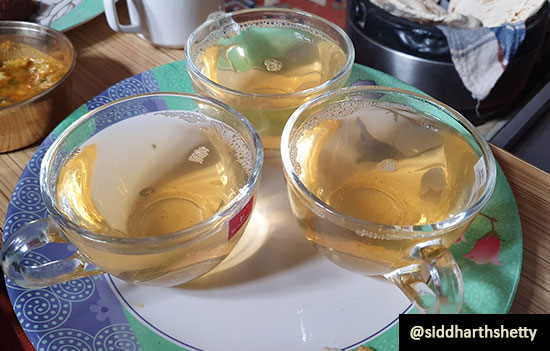 Sea buckthorn tea.
Sea buckthorn tea.
Sea buckthorn
is a wild shrub which grows in abundance in these parts. Its berries are known for
their anti-cancer properties.
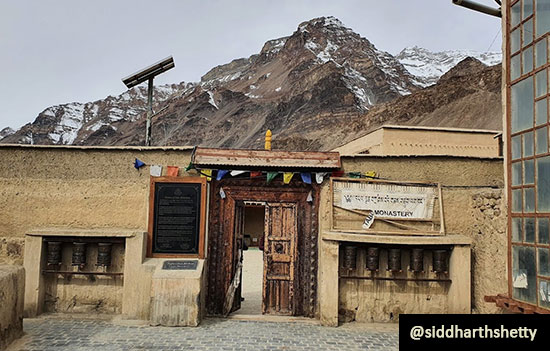 The oldest running monastery in India.
The oldest running monastery in India.
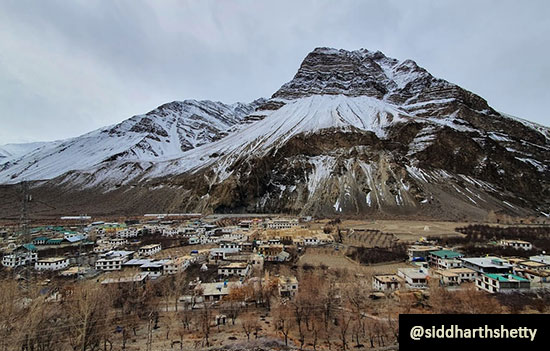 Tabo town viewed from a vantage point nearby.
Tabo town viewed from a vantage point nearby.
To see
2001 album on Spiti Valley
To
see 2013 album on Tabo
Also read Tabo
Monastery, Ajanta in the Himalayas
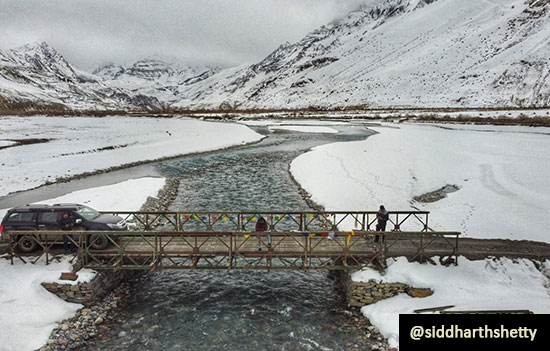 Enroute to Kaza we stumbled across this bridge in snow covered terrain, loved it so clicked.
Enroute to Kaza we stumbled across this bridge in snow covered terrain, loved it so clicked.
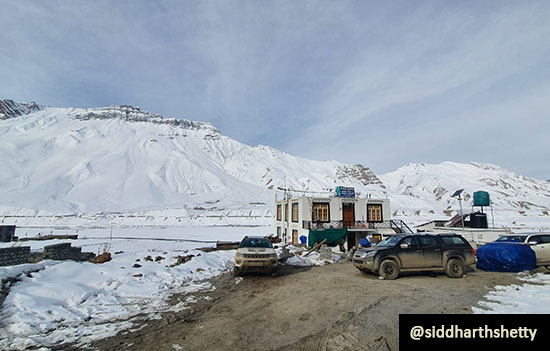 Our home stay in Kaza.
Our home stay in Kaza.
It is Phuljung
Home stay (not like the traditional home stay in Tabo but had a tandoor room
heater in every room). Service and food was decent. Contact
8988355559/8988465809
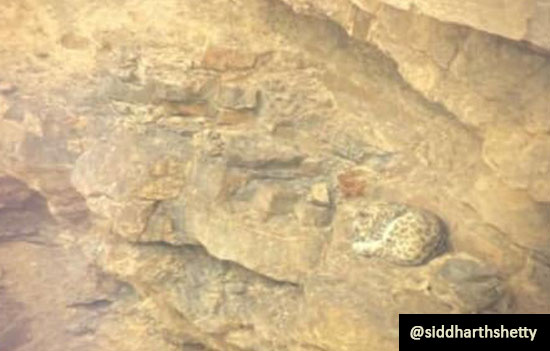 Sleeping Snow Leopard.
Sleeping Snow Leopard.
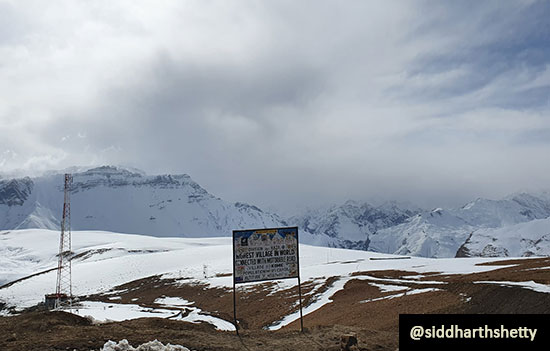 KOMIC, supposedly the highest village accessible by road.
KOMIC, supposedly the highest village accessible by road.
It is not that far from Kaza distance wise (about 20-25 kms) but it can take a few hours to reach here especially during the winter months of December through March due to heavy snow fall in these parts which can made the roads difficult to navigate. We saw several bikers and cars giving up on this road half-way since they could not navigate the snow. The Isuzu’s 4x4 capabilities were put to good use in this stretch and we were able to sail through.
At Kaza we stayed for two nights. The first night was when we
reached there and decided to rest. The second day is when we went visiting
Chicham Bridge, Kibber, Langza, Hikkim and Komic. Near Kibber we spotted the
snow leopard.
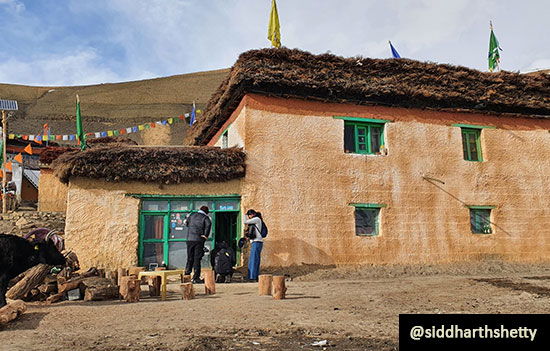 HIKKIM village claims to have the highest post office in the world.
HIKKIM village claims to have the highest post office in the world.
This is
about 20 kms from Kaza but the terrain in winters can mean it takes a few hours
to reach.
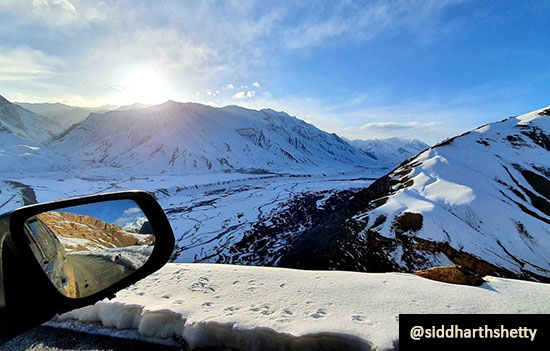 You can click countless pics at every few hundred meters here.
You can click countless pics at every few hundred meters here.
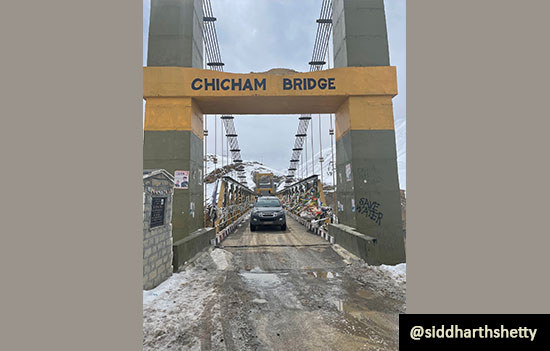 At 13,596 feet Chicham Bridge is amongst the highest bridge globally.
At 13,596 feet Chicham Bridge is amongst the highest bridge globally.
The bridge
in Spiti Valley connects two villages Kibber and Chicham. Look down and 1000
feet below is a gorge. It was constructed over 15 years and opened in 2017.
Also read and see pictures
of Chicham Bridge
Our return journey was the route we came by. (Kaza-Tabo-Pooh-Powari-Rampur)
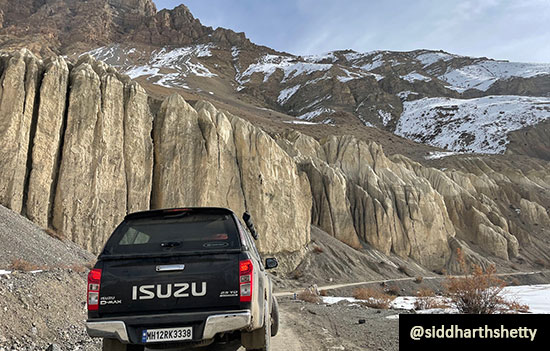 On the outskirts of Tabo, during out return journey.
On the outskirts of Tabo, during out return journey.
Some travel notes and tips
1. The lowest temperature we experienced was during the second night at Kaza where the temperature dropped to – 15 degree Celsius.
2. Even though I was thinking about additives for diesel and coolant, I didn’t go for any of the additives since I was told that by early March the colder weather starts receding and additives are not required. I did carry a heavy duty tarp which we used to cover the bonnet of the truck for the two nights in Kaza. We also made sure that we started the truck at midnight (before retiring for the night) at Kaza, Chitkul and Tabo which had the coldest nights as compared to other locations.
3. The truck started in the first attempt on all mornings.
4. The fuel bunk at Kaza and Powari did not have anti-freeze diesel.
5. We didn’t need to use the jerry can that we had carried. Neither did we need to use the sand ladders and snow chains.
6. Crawling mode of the truck got us out of some very tricky situations on sharp inclines at Hikkim, Langza and Komic.
7. We spotted a snow leopard sleeping in one of the cliffs near Kibber. This was a dream come true for all of us. In addition to the snow leopard we were also able to spot snow foxes, eagles and ibex as we approached Kaza.
8. Jio works the best here as compared to other networks.
9. We wore atleast two layers of clothing underneath our jackets in Chitkul, Tabo and Kaza. In Kalpa we could manage with a single layer underneath our jacket.
10. Home stays either have a room heater, bed heater or a central wood fired tandoor. The bed heater is probably the best option as the temperature drops at he night. Then room heater is insufficient and the tandoor dies down once all the wood inside it has burnt out.
11. Locals throughout Himachal Pradesh are very welcoming and they see tourists as an essential part of their livelihoods. Not a single person tried ripping us for extra money. They don’t ask or expect tips either but we were so happy with the service and care that we tipped them handsomely. It is priceless to see their faces when you tip them.
On our return journey we stopped at a car wash enroute to Rampur. They did a thorough job and charged us only Rs 250/ but we paid them Rs 500/. It shocked them at first but upon our insistence they kept the money. Their smiles showed our good karma and we got blessings – both of which were needed for the long journey to Pune.
12. People of different age groups are involved in the tourism services. Women seem to have a more prominent role here in decision
making compared to men and are active
contributors to the tourism economy in Himachal Pradesh.
How did the Isuzu VCross 2.5 litres
perform?
The vehicle performed brilliantly.
We had prepared for harsh weather, carried
ready to cook food and vehicle accessories like snow chains, sand ladders,
showel etc. This was primarily because it was a solo drive, we were not in a
convoy. Hence, our payload was quite high as compared to a normal bunch of
travellers.
There were a few sections in Chitkul,
Langza and Hikkim where the truck had some challenges in climbing up steep
inclines from a dead start and I would think this may be the case with most
diesel vehicles in such stretches. These were not show-stoppers though. We got
out of such situations with repeated attempts at getting the truck to climb up
such slopes. Also, we used 4 high in some snow laden roads in Kibber and Langza
and 4 Low in some really tricky stretches of the Langza-Hikkim route and a few
other places where there was wheel spin. At one point in Kalpa, the rear right
wheel got stuck in a huge gap in a gutter and 4 Low got us out of this
situation, otherwise would require a rescue vehicle.
We took the Rajasthan-Gujarat route on the return journey to Pune. We had Punjabi food at Pal Dhabha, Chandigarh. Mutton dishes at Handi restaurent Jaipur and Raju Omlette/Rajasthan Kulfi in Baroda. In short, we had enjoyed every dinner. Next time we hope to cover Pin
Valley in Spiti and Ladakh.
Also see albums
1. Drive
Chandigarh to Leh
2. Cycling
Manali to Leh
3. Drive
Leh to Kargil
4. Drive
Manali to Srinagar
5. Drive Leh to Zanskar Valley, new route